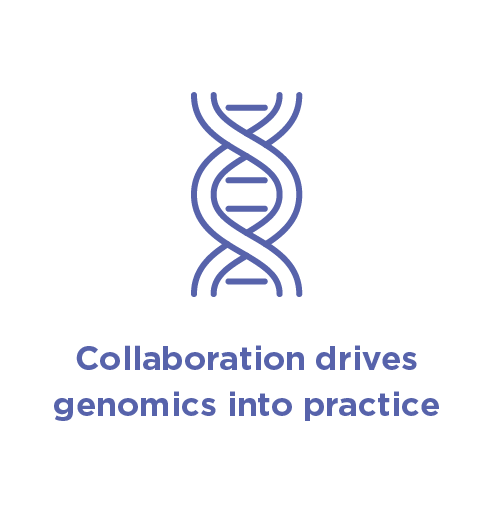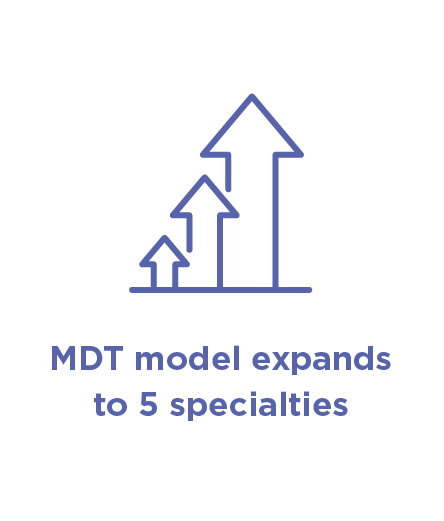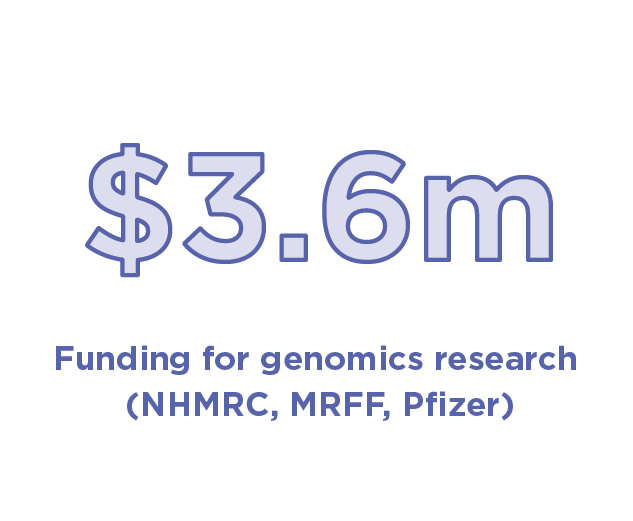Sydney Health Partners is an NHMRC-accredited Research Translation Centre. We collaborate to deliver research-informed healthcare and training. The below case studies highlight our work in translating research into better health outcomes and building capability across the system.
Case studies on this page:

Case studies from all Research Translation Centres are available from Impact and outcomes.
Developing, re-designing or adopting platforms, systems or workforce initiatives
Challenge
Genomic testing provides important information about the genetic causes underlying many health conditions and, in some cases, the likely response to different treatments. Genomics is rapidly expanding into almost every field of medicine, however access to genomic expertise is limited by shortfalls in the genetics workforce, long waitlists, and inconsistent integration of genomics into clinical decision-making, adversely impacting patients and families who might benefit.
Genomic mainstreaming – the uptake and practice of genomics by non-genetics healthcare professionals – has been promoted in national and statewide strategies as one possible solution to facilitate increased access to genomic testing, and has been identified as an important priority for the future development of services within our Sydney Children’s Hospitals Network (SCHN).
Approach
Dr Alan Ma (Senior Staff Specialist in Clinical Genetics, SCHN) has led a program of research to build capacity among health professionals for interpreting and using genomics.
Through a systematic review he established from evidence that a genomic multidisciplinary team (MDT) model was the most effective approach for collaborating, upskilling in genomics, and facilitating mainstreaming.
He then developed and evaluated a model using 3 genomic MDTs: paediatric neurology, general paediatrics, and ocular genomics.
He demonstrated the model was scalable and could successfully integrate genomics into routine healthcare. His research also identified factors that determined successful implementation and sustainability of genomic MDTs.1-3
Significance
Dr Ma’s work showed that interdisciplinary collaboration in an MDT setting involving genomics experts and clinicians in different subspecialties leads to increased clinical knowledge and mainstreaming of genomics testing, improved uptake of genomics in healthcare, and improved diagnosis of complex cases.
Dr Ma’s MDT model has been extended to 5 further specialty areas including oncology, hearing loss, and fetal medicine.
He has attracted research funding from the NHMRC ($1.5 million) to study genomic testing for genetic blindness, funding from the Australian Government Department of Health, Disability and Ageing under the Medical Research Future Fund (MRFF) to study genomic mainstreaming in primary care ($1.9 million), and funding from Pfizer Industry ($232,000) to study psychosocial impacts of gene therapies and co-design of a patient-informed model of care.
These projects involve partnerships with consumer and patient support groups, Health Consumers NSW, Genetic Alliance, and Retina Australia.




Value-add of centre
Dr Ma was awarded a Sydney Health Partners (SHP) Research Translation Fellowship in 2021 which gave him protected time (0.4 Full Time Equivalent) for research and allowed him to complete an initial systematic review.
During the current accreditation period he has also participated in capacity building programs offered by SHP’s Implementation Science Academy to upskill in research translation methods, and in training to establish effective consumer partnerships, both for himself and more recently as a mentor to others.
He was invited to join the leadership team of the SHP Genomics and Precision Medicine Clinical Academic Group, through which he is working with colleagues to promote genomic MDTs and genomic upskilling among our health Partners.
Reach
Since 2020, over 1,000 patients have benefited from access to genomic MDTs at SCHN.
Dr Ma and his colleagues have also collaborated with the NSW Agency for Clinical Innovation to draft guiding principles for genomic MDTs throughout the state, promoting scalability and standardisation; these are now being considered in South Australia and Victoria.
Next steps
Dr Ma is working with health professionals and consumers across our Partnership to identify additional implementation strategies to support genomic mainstreaming as well as scalability factors to enable uptake of genomics into the wider health system.
References
1 O'Shea R, Ma AS, Jamieson RV, Rankin NM. Precision medicine in Australia: now is the time to get it right. Med J Aust 2022; 217: 559-563.
2 Ma A, Newing TP, O'Shea R, et al. Genomic multidisciplinary teams: a model for navigating genetic mainstreaming and precision medicine. J Paediatr Child Health 2024; 60: 118-124.
3 Ma A, O'Shea R, Wedd L, et al. What is the power of a genomic multidisciplinary team approach? A systematic review of implementation and sustainability. Eur J Hum Genet 2024; 32: 381-391.
Providing better care
Challenge
Effective, evidence-based management of low back pain in hospital Emergency Departments (EDs) is a major priority for our health Partners, as 70–85% of people with low back pain who present to ED are prescribed opioids despite little evidence of efficacy and significant risks of harm. Guidelines on reducing opioid use exist but have not been successfully implemented at scale.
Approach
Associate Professor Gustavo Machado and colleagues have led a program of research since 2016 showing that opioid use is not helpful for most people with back pain, and that providing clinician education and resources, implementing new models of care, and monitoring through audit and feedback can lead to sustained reduced opioid use, better patient outcomes and significant cost savings to the health system.
Associate Professor Machado’s research has included large clinical trials, observational studies, systematic reviews, and implementation research. He has partnered with EDs across metropolitan and rural hospitals involving 269 clinicians and 4,491 patients, NSW Ambulance Service, eHealth NSW, and policy makers in the NSW Agency for Clinical Innovation.
Significance
Associate Professor Machado’s research has challenged current practices, improved clinician knowledge of treatment options, and supported implementation of best practice guidelines and better health care. New treatment approaches now include a triage process to identify people with non-serious low back pain for outpatient management, physiotherapist-led care for appropriate cases (reducing reliance on physicians), virtual care models enabling remote consultations and monitoring of patients, and reduced opioid prescriptions in ED (by as much as 24%).
Research has also demonstrated this intervention was cost-effective and sustained for over 3 years, shaping statewide policy by informing The Special Commission of Inquiry into Healthcare Funding.
Associate Professor Machado’s research has been published in journals such as British Medical Journal, Lancet Rheum, Cochrane and the British Journal of Sports Medicine.1-5 He has presented at national and international conferences (for example, World Physiotherapy Congress), and has been awarded over $20 million in research funding (including from NHMRC and the Australian Department of Health, Disability and Ageing’s Medical Research Future Fund (MRFF)).
Associate Professor Machado has received several awards, including the 2023 Research Australia Health Services Research Award, and the 2022 Australia and New Zealand Musculoskeletal Clinical Trials Network Trial of the Year Award.
Value-add of centre
Sydney Health Partners (SHP) awarded Associate Professor Machado seed funding of $90,000 in 2016 for his initial postdoctoral research into opioid use for back pain presentations in ED (from funding received from the Australian Department of Health, Disability and Ageing’s MRFF Rapid Applied Research Translation Initiative). This funding came at a critical stage in his career and enabled him to develop an important program of work targeting a specific health service priority (reducing low-value care) and supporting implementation of best practice guidelines at scale across our Partnership and beyond.
During the current accreditation period we have provided ongoing support through specialist training in implementation science, practical support in the successful grant applications indicated below, and promoted Associate Professor Machado’s work across the Partnership, for example, through our impact reporting publication and inviting him as a keynote speaker at SHP’s 2024 Clinical Trial Symposium.
Reach
Associate Professor Machado’s research has had significant reach, with over 600 stories in more than 100 media outlets (for example, The New York Times, The Times UK, ABC Health Report), and significant presence on social media, with tweets from 48 countries.
His research has been used in 42 guidelines globally (including UK NICE, American College of Physicians, and German Society for Orthopaedics).
His recommended model of care has been adopted by other health services, including Royal Brisbane and Women’s Hospital, and Fiona Stanley Hospital in Perth.
Next steps
Associate Professor Machado continues to lead research extending and scaling-up better treatment options for people with low back pain, including a study comparing physiotherapy-led services with usual care in EDs across 5 health services (MRFF 2022, $2.8 million); a trial testing analgesic medications for low back pain in EDs (MRFF 2023, $3.2 million); a new referral pathway for paramedics to reduce hospital visits (Hospital Contribution Fund (HCF) Research Foundation 2024, $350,000); and testing optimal implementation strategies for back pain guidelines in EDs (MRFF 2025, $4.8 million).
References
1 Coombs D, Machado GC, Richards B, et al. Effectiveness of a multifaceted intervention to improve emergency department care of low back pain: a stepped-wedge cluster-randomised trial. BMJ Qual Saf 2021; 30: 825-835.
2 Jones C, Coombs D, Lin CWC, et al. Implementation of a model of care for low back pain produces sustained reduction in opioid use in emergency departments. Emerg Med J 2023; 40: 359-360.
3 Oliveira CB, Coombs D, Machado GC, et al. Process evaluation of the implementation of an evidence-based model of care for low back pain in Australian emergency departments. Musculoskelet Sci Pract 2023; 66: 102814.
4 Côté-Picard C, Coombs DM, Li Q, et al. Shifting from opioids to simple analgesics for emergency care of patients with low back pain: a secondary analysis of the SHAPED cluster randomized trial. JAMA Health Forum 2024; 5: e243008.
5 de Campos TF, Coombs DM, Sigera C, et al., for the RESHAP-ED Investigators. Effectiveness of primary-contact physiotherapy in managing musculoskeletal conditions in emergency departments: protocol for the RESHAP-ED randomised controlled trial. BMJ Open 2025; Accepted on 25 Feb.
Meeting the needs of your end-users in your population: health carers and patients
Challenge
Older people have higher health care needs, often due to multiple chronic conditions requiring use of more health services, including general practice, medical specialists, allied health, attending Emergency Departments (EDs), and being admitted to hospital.
One third of Australians aged over 70 years take 5 or more medications, increasing their risk for adverse drug reactions, and 1 in every 5 medications is estimated to cause more harm than good.
Our health Partners have identified the need to improve the care provided to older people in our hospitals, including better targeting of services appropriate to need.
Approach
Improved engagement with elderly patients and their families, and shared decision making with clinicians about care, largely depends on sharing information about care options and choices and understanding patients’ preferences.1
Professor Sarah Hilmer AM, at the Kolling Institute, leads a wide range of research programs in ageing and pharmacology that aim to make information more readily available to support informed healthcare decisions. Working with clinicians and elderly consumers, she has co-designed consumer guides on deprescribing of antipsychotics, benzodiazepines and proton pump inhibitors.2-6
In 2022, she co-led the establishment of the Sydney Health Partners Geriatric Medicine Clinical Academic Group (CAG), working with researchers, clinicians and consumers to build capacity for providing research-informed care for older people in hospital, at transitions of care and in the community (including residential aged care). This work has a particular focus on the needs of the frail elderly receiving hospital care.
Significance
Professor Hilmer’s work on deprescribing has resulted in a range of consumer information products for older hospital patients and their carers. The resources are freely available to clinicians on the NSW Therapeutic Advisory Group website and widely accessible.
She developed the Drug Burden Index to measure the overall risk of a person's medicines to their physical and cognitive function, which is used by clinicians across Northern Sydney and Central Coast Local Health Districts, is under technical review for integration in the NSW Health Single Digital Patient Record and is used in research nationally and internationally.7
Working with collaborators across Australia, her current research program aims to bring models of care in line with international guidelines on routinely screening older people for frailty, and will help inform health services about the facilities, resources and staff required to meet the needs of people with frailty.
Value-add of centre
In 2018, Sydney Health Partners (SHP) awarded Professor Hilmer seed funding of $200,000 received from the Australian Government Department of Health, Disability and Ageing under the Medical Research Future Fund (MRFF) Rapid Applied Research Translation Initiative to co-develop and evaluate consumer information leaflets about ceasing to use inappropriate medications.
In the current accreditation period, SHP’s CAG Program provided an opportunity for Professor Hilmer to lead the establishment of a new network of collaborators focused on Geriatric Medicine, bringing together multidisciplinary researchers, clinicians, consumers and policy makers. Through this, she has initiated and partnered in several new collaborations across SHP and nationally, building capacity in geriatric medicine translational research.
Reach
Professor Hilmer’s research has had significant impacts on changing clinical practice; helping clinicians and patients make evidence-informed decisions about medications use; and implementing evidence-based care for older people, including frail elderly.
She collaborates across SHP, nationally and internationally, and has published over 350 journal articles.
Next steps
Professor Hilmer continues to lead research on how older people can be supported to avoid hospitalisations, receive optimal care when admitted, and achieve the best health outcomes through integrated and coordinated in- and post-hospital interventions.
Current research grants include $1.2 million from the NHMRC to optimise medication use in frail older people (2020-2025); and $3 million from the MRFF for a new clinical implementation study which will automatically screen older patients for frailty in real time. This latter grant specifically came through partnerships enabled by the SHP Geriatric Medicine CAG.
References
1 Elwyn G, Frosch D, Thomson R, et al. Shared decision making: a model for clinical practice. J Gen Intern Med 2012; 27: 1361-1367.
2 Reeve E, Chenoweth L, Sawan M, et al. Consumer and healthcare professional led priority setting for quality use of medicines in people with dementia: gathering unanswered research questions. J Alzheimer's Dis 2023; 91: 933-960.
3 Jamieson H, Nishtala P, Bergler H, et al. Deprescribing anticholinergic and sedative drugs to reduce polypharmacy in frail older adults living in the community: a randomized controlled trial. J Gerontol A Biol Sci Med Sci 2023; 78: 1692-1700.
4 Ailabouni N, Thompson W, Hilmer S, et al. Co-designing a consult patient decision aid for continuation versus deprescribing cholinesterase inhibitors in people living with dementia. Drugs Aging 2024; 41: 821-831.
5 Okafor C, Etherton-Beer C, Keramat S, et al. Cost-consequence analysis of deprescribing to optimize health outcomes for frail older people: a within-trial analysis. JAMDA 2024; 25: 539-544 e2.
6 Reeve E, Gnjidic D, Langford A, Hilmer S. Deprescribing antihypertensive drugs in frail older adults. Aust Prescr 2024; 47: 85-90.
7 Olender R, Roy S, Jamieson H, et al. Drug Burden Index is a modifiable predictor of 30-day hospitalization in community dwelling older adults with complex care needs: machine learning analysis of InterRAI data. J Gerontol A Biol Sci Med Sci 2024; 79: glae130.

